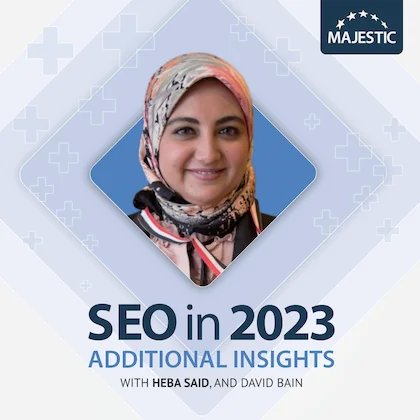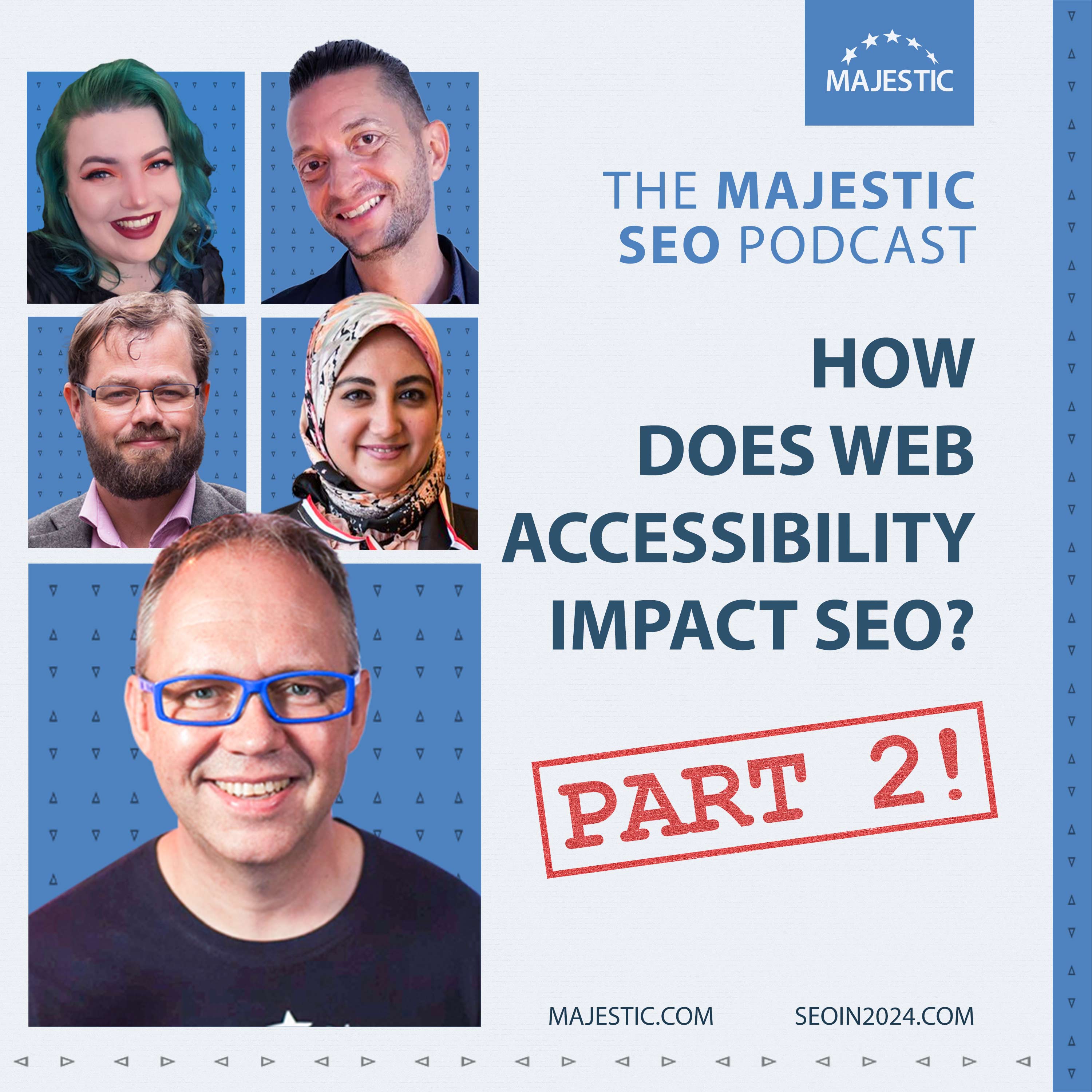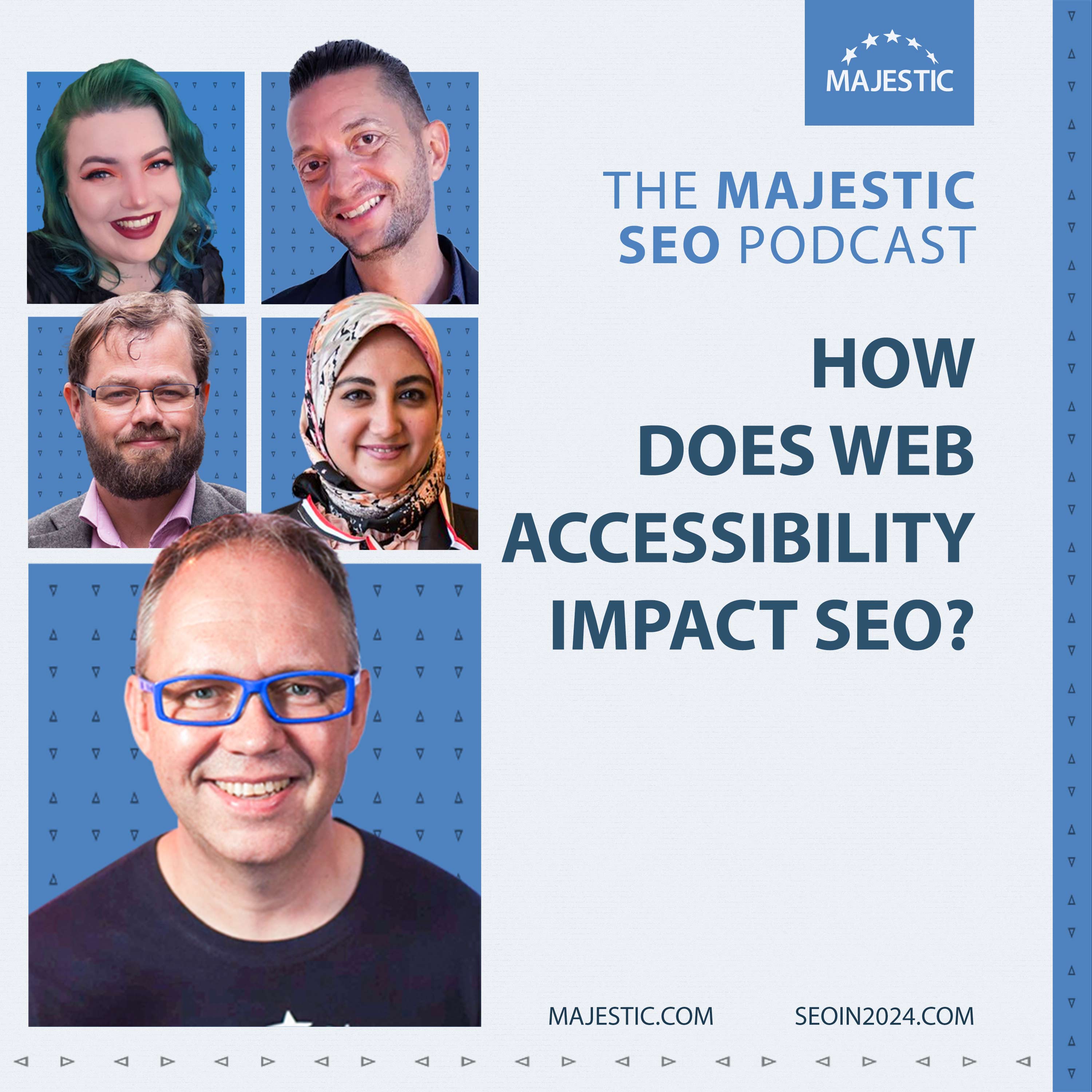-
Site Explorer
- Majestic
- Summary
- Ref Domains
- Backlinks
 New
New Lost
Lost- Context
- Anchor Text
- Pages
- Topics
- Link Graph
- Related Sites
- Advanced Tools
- Author ExplorerBeta
- Summary
- Similar Profiles
- Profile Backlinks
- Attributions
- Compare
-
Link Tools
- My Majestic
- Recent Activity
- Reports
- Campaigns
- Verified Domains
- OpenApps
- API Keys
- Keywords
- Keyword Generator
- Keyword Checker
- Search Explorer
- Link Tools
- Bulk Backlinks
- Neighbourhood Checker
- Submit URLs
- Experimental
- Index Merger
- Link Profile Fight
- Mutual Links
- Solo Links
- PDF Report
- Typo Domain
- Free SEO Tools
- Support
How does site accessibility impact SEO?
Heba Said
Heba Said shares the importance of accessibility for our users, and how it benefits our websites and our SEO ability

Heba Said says “My additional insight for SEO in 2023 is the importance of accessibility for the web pages, how that impacts our technique in SEO and how we can impact that on our websites”
Can you provide then a brief summary of where we are with accessibility at the moment? What are the key elements of accessibility at the moment that are particularly relevant for SEOs?
“So web content is talking right now about accessibility, and this is where SEO comes in, because when Google talks about a user experience or a core update, or something like that, it goes ‘How is the user interacting with your website? How is the user is reaching your content and understanding your content?’ So if we're not doing this for our website, we're losing a lot of diversity here. Some numbers say that 15% of users are people with a disability. There are a number of different impairments, is it vision, intellectual or physical disability. Around 2.2 billion people in the world have a visual impairment of some kind. So if we're not targeting these people, we're losing a lot of visitors to our website, and our clients are losing revenue and losing sales. So as an SEO, we have the responsibility to make these easier for users to use, we want to make this website easier for users, we want to make this website easier for crawlers to crawl the website and to rank afterward. So to make it accessible, we need to go through four core points. It needs to be Perceivable, Operable, Understandable and Robust. What does that mean? For me it’s making everything in the website, including our HTML code, accessible, it should be easy, it should be simple for assistive technologies to read this. Right now we have assistive technology for different impairments, and these technologies are using operating systems, and these systems need to get into your website and read each and every details. So it should be accessible, it should be organized, it shouldn't be repeatable, and as SEOs we need to make this content usable for the user. So we have techniques for SEO like title tags, description, tags, headings, etc, and these are the important things that we should go through and make it unique for each page.”
How does Google actually judge whether your site is delivering a great user experience? Is Google just looking at the source code of a webpage to determine if that web page is accessible?
“Google is using a tools like assistive tools. When someone is using an assistive tool, and it's very easy for their tool to read the website, without any complication, and without delay, that means that Google will do the same. They will see the website with ease and without delay, which means it’s going to be faster, it's going to be mobile friendly, it's going to be user friendly, and these are the things that Google are mentioning every single day that we should do to make our website faster. We shouldn't have a delay, we shouldn't have a pop up from anywhere, we don’t need that to deliver the content in a more accessible way.”
If an SEO is just getting started with making their websites more accessible, what are the initial steps they should take, and what are the key elements to get right to begin with?
“If you're using JavaScript, you should ask your developer to look into the code and use an ARIA code. It's something that's out there for developers that they can use and it's very easy for the assistive technology to read. The next thing we do is go to Lighthouse and see how it's performing, and how the speed is. Every single detail in this kind of report is very important for accessibility. So if you can go into depth of coding, then you just have to do your work. You have to add alt tags for images, you have to add transcripts to your videos and add audio descriptions of what's happening inside your website. If you're delivering your content in videos, and someone is blind or visually impaired, that will be hard for them to understand what you're doing. Again, this means you're losing about 2 billion of people out there, and this is a very simple step that you can take that is not very hard. You can also edit the font you use, for example, if the font is very small, you can add a feature to the website that you can enlarge fonts for everyone, and this is something very easy to do. The same goes for high contrast colors for the background and the foreground and other stuff like that. Adding tags is our daily job, so adding tags for each and every page is going to be very easy for any user to use, including Google, of course. This kind of thing is like the navigation, it should be the same for each page, and it should be simple and direct. Finally, you should have an easy sitemap for everyone to use.”
You’re talking about an HTML Sitemap?
“Yes, that will be very helpful.”
How do you measure the impact of accessibility on SEO? How does Google take what you're doing with accessibility on your site, and use that information to determine where you should be ranked and how your ranking should improve?
“It doesn’t work in the normal way ranking should improve, but because you're doing accessibility, if you're delivering the content for everyone, and you're having a high demand for your content, and you’re having a smaller bounce rate and higher demand for a website, then that will work good for your business. You need your business to prosper, to gain more users and to get more sales, whatever business you're delivering the content for. This is how it works, because when someone is visiting my website every day, because they think it's very informative and this is how they get the answer for their queries and stuff like that, that will encourage Google to crawl more of my website, to index more of my website and the new content that I'm adding, and it's going to be indexed easier and faster, because this is a website that has an expertise, the people trust them, they have good content that users are relying on. So this is how you can gain more traffic and more sales, and that's how we can compare before accessibility and after. It's the same thing as comparing before SEO and after SEO.”
Are other search engines picking up on these kinds of metrics and making positive decisions on the result of accessibility just as much as Google is?
“Yes, because every search engine is now looking at the speed and the coding of a website. This is all reliant on the accessibility as well. So when we talk about Google here, we talking about any technology that is trying to enter your website and read whatever you have on your website without seeing any images or any colors or anything, just reading the code itself. So it should be easy for the technology that you're using and any technology that people with disabilities use as well.”
Are there any other software tools that you recommend for doing an analysis on how a website or webpage is performing from an accessibility perspective?
“If you want to check if your website is using accessibility well or not, or if you want to know if you're having any error, I recommend the Axe dev tool, which is a web accessibility testing tool that you can download via Chrome extension. This tool accesses your web page and a debugs every data inside your web page and gets you the report that you would need if you want to check for accessibility. Another one is called Wave, and it does the same thing. It debugs the website within the tool, and then the tool gets you what you need to do to gain more accessibility, or if you're having any issues it lets you know of any error out there that you can fix.”
What's something that's seductive in terms of time, but ultimately counterproductive? What's something that SEOs shouldn't be doing in 2023?
“I still see people thinking about how Google is working, rather than thinking about what the user needs from you. When you're working with a website or a new client, you just need to see how the client needs their user to find them more. When you work in user based, you're going to be more creative, you're going to know how you're going to target that user and how you can serve them and make this website accessible for them, more than just thinking about some software that you should rank for. So if you're using this as a user based website first, and then a crawler, it's gonna help you to rank very well in Google. Take a step back, and when you're thinking about things and buying links, and guest posting and stuff like that, just concentrate on your website, make it more accessible for people, put up very useful content, target your user first and then think about everything else.”
Should SEOs think about both the user and Google or only focus on the user and Google will naturally follow from that?
“If we focused on the user, then I'm focused on their diversity, and how someone with visual impairment can see my website, and how someone with an auditory impairment can check my website, and these things mean that I can make it accessible for software, which is where Google comes in. So if you're thinking about these people, then it will come later that you're thinking about Google itself.”
Heba Said is a freelance SEO who used to work for Canva, and you can find her by searching Heba Said on LinkedIn.
Also with Heba Said
Choose Your Own Learning Style
 Video
Video
If you like to get up-close with your favourite SEO experts, these one-to-one interviews might just be for you.
Watch all of our episodes, FREE, on our dedicated SEO in 2023: Additional Insights playlist.
 Podcast
Podcast
Maybe you are more of a listener than a watcher, or prefer to learn while you commute.
SEO in 2023: Additional Insights is available now via all the usual podcast platforms
 SEO in 2023
SEO in 2023
Catch up on SEO tips from 101 SEO experts in the original SEO in 2023 series
Available as a video series, podcast, and a book.
Could we improve this page for you? Please tell us







